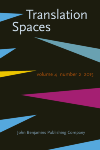
Translation Spaces
Scope & Guideline
Advancing Interdisciplinary Insights in Translation Studies
Introduction
Aims and Scopes
- Localization and Cultural Adaptation:
The journal emphasizes the role of translation in localizing content across various media, particularly in video games and digital platforms, highlighting the need for cultural sensitivity. - Machine Translation and Technology Integration:
A significant focus is placed on the relationship between machine translation and human translation, exploring the implications of technology on translation practices and quality assessment. - Job Satisfaction and Professional Well-being:
Research often addresses the job satisfaction and quality of life for translators and interpreters, emphasizing the importance of these factors in professional practice. - Ethics and Social Issues in Translation:
The journal explores ethical dilemmas faced by translators and interpreters, particularly in public service contexts, and their impact on the profession and society. - Experimental and Mixed Methodologies:
Translation Spaces supports the use of innovative research methodologies, including experimental designs and mixed methods, to advance the understanding of translation processes and outcomes.
Trending and Emerging
- Impact of Machine Translation on Professional Practices:
The discourse surrounding the effectiveness and implications of machine translation is gaining traction, with studies examining how it interacts with human translation and affects job roles. - Well-being and Job Satisfaction in Translation Professions:
There is a growing focus on the well-being of translators and interpreters, addressing factors influencing job satisfaction and the implications of work conditions, especially post-COVID-19. - Sustainable Development and Translation:
Emerging themes connect translation practices with sustainable development goals, particularly in low-resource settings and the role of indirect translation in promoting sustainability. - Cultural Localization in Gaming and Media:
The localization of video games and other media is increasingly recognized as a critical area of study, highlighting the cultural and social implications of translation in entertainment. - Ethical Dilemmas in Translation:
An increasing number of papers are addressing ethical challenges and dilemmas faced by translators in various contexts, reflecting a growing awareness of the social responsibilities of the profession.
Declining or Waning
- Traditional Literary Translation:
There seems to be a decline in the exploration of traditional literary translation practices, as newer papers focus more on technology-driven approaches and localization. - Historical Analysis of Translation Practices:
Research that delves into historical aspects of translation and its evolution appears less frequently, suggesting a shift towards contemporary issues and methodologies. - Translation of Humor and Cultural Nuances:
The exploration of humor and its translation, which was more prominent in earlier publications, is becoming less common, as the journal prioritizes broader sociocultural and technological themes. - Static Translation Models:
There is a noticeable decrease in the use of rigid translation models and frameworks, as the journal increasingly favors dynamic and context-sensitive approaches.
Similar Journals

Quaderns-Revista de Traduccio
Unveiling the Art of Translation ExcellenceQuaderns-Revista de Traduccio, published by the Universitat Autònoma de Barcelona, is a prominent journal in the field of Linguistics and Language, which has garnered recognition for its scholarly contributions since its inception. With an ISSN of 1138-5790 and an E-ISSN of 2014-9735, this journal has maintained an active publication schedule across notable cycles, contributing valuable insights from 2011 to 2018 and continuing from 2020 to 2024. As a Q3 category journal in both Arts and Humanities and Social Sciences related to Language and Linguistics, it occupies an important niche, ranking #607 out of 1088 and #692 out of 1167 respectively. Though currently not an open-access journal, its rigorous peer-review process ensures that published articles meet high academic standards, making them relevant for researchers, professionals, and students alike. Housed in Cerdanyola del Vallès, Barcelona, this journal serves as a critical platform for the dissemination of cutting-edge translation studies and linguistics research.

Estudios de Traduccion
Shaping the future of translation with interdisciplinary insights.Estudios de Traduccion is a distinguished academic journal published by UNIV COMPLUTENSE MADRID, SERVICIO PUBLICACIONES, dedicated to advancing the field of translation studies. Since its establishment, the journal has embraced an Open Access model, providing researchers, professionals, and students with free and unrestricted access to high-quality scholarly articles since 2011. With the ISSN 2174-047X and E-ISSN 2254-1756, it serves as a vital resource for those interested in innovative methodologies, theoretical advancements, and practical applications within translation. By championing interdisciplinary research and fostering dialogue among scholars from diverse backgrounds, Estudios de Traduccion plays a crucial role in shaping the understanding of translation as a dynamic and evolving discipline. As a reputable platform, it invites contributions that stimulate critical thought and inspire future research in this essential area of communication.

Panacea-Boletin de Medicina y Traduccion
Unveiling New Trends in Medical Translation and LinguisticsPanacea-Boletin de Medicina y Traduccion, published by TREMEDICA, serves as a valuable academic resource within the field of linguistics and language translation. With an ISSN of 1537-1964 and coverage from 2012 to 2023, this journal has established itself with an impressive Q2 ranking in the 2023 category of Linguistics and Language, indicating its significant contribution to the scholarly dialogue in this domain. The journal's rankings within Scopus, including the 41st percentile in Arts and Humanities and the 38th in Social Sciences, highlight its recognition and relevance among peers. Although it operates under a traditional access model, the journal remains committed to disseminating high-quality research that bridges the gap between medicine and linguistic translation, thereby enhancing interdisciplinary understanding and collaboration. For researchers, professionals, and students alike, Panacea-Boletin de Medicina y Traduccion stands as an essential publication for exploring emerging trends and fostering innovation in linguistic practices.

Tradumatica-Traduccio i Tecnologies de la Informacio i la Comunicacio
Bridging Linguistics and InnovationTradumatica-Traduccio i Tecnologies de la Informacio i la Comunicacio, published by the Universitat Autònoma de Barcelona, is a prestigious open-access journal that has established itself as a leading platform in the fields of Linguistics, Literature, and Communication Technologies since its inception in 2010. With its recent classification in the Q1 category of both Linguistics and Literary Theory, and an impressive 97th percentile ranking in Literature and Literary Theory on Scopus, this journal is recognized for its contribution to high-quality scholarly research. The journal serves as a vital resource for researchers, professionals, and students who are engaged in the dynamic intersection of translation studies and technology. Music its comprehensive coverage from 2019 to 2023, it aims to foster dialogues and advancements in translation methodologies and practices, making it indispensable for those looking to remain at the forefront of innovations in the field. Located in vibrant Barcelona, Spain, the journal provides an invaluable avenue for disseminating influential research while promoting an international scholarly community.
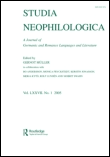
STUDIA NEOPHILOLOGICA
Charting New Territories in Linguistic ResearchSTUDIA NEOPHILOLOGICA, published by Routledge Journals, Taylor & Francis Ltd, is a distinguished periodic publication that has been contributing to the fields of Linguistics and Philosophy since its inception in 1928. With an ISSN of 0039-3274 and E-ISSN 1651-2308, this journal is recognized within the academic community as an essential platform for innovative research and scholarship. It currently holds a Q3 quartile ranking in both Linguistics and Philosophy categories for 2023, further illustrating its relevance in a competitive landscape, where it ranks #465 out of 1088 in Scopus Ranks for Language and Linguistics. Although not openly accessible, the journal provides vital insights and analyses that push the boundaries of understanding language and its philosophical implications. With a coverage spanning from 1928 to 2024, STUDIA NEOPHILOLOGICA is indispensable for researchers, professionals, and students eager to expand their knowledge and engage with critical discussions in these disciplines.

Translation & Interpreting-The International Journal of Translation and Interpreting
Navigating the Complexities of Translation and Interpretation TogetherTranslation & Interpreting is the premier Open Access journal dedicated to the intricate fields of translation and interpreting, published by the University of Western Sydney's Interpreting & Translation Research Group. With an established reputation since its inception in 2009, this journal has quickly ascended to become a vital resource, recognized in the 2023 Q1 quartile rankings for both Linguistics and Language as well as Literature and Literary Theory. Its high standing is further supported by impressive Scopus rankings, placing it among the top journals in its field—#21 out of 1106 in Literature and Literary Theory and #204 out of 1088 in Language and Linguistics. With a commitment to disseminating original research and innovative practices, Translation & Interpreting serves as a crucial platform for scholars, practitioners, and students who aspire to deepen their understanding of translation dynamics and interpretation methodologies. Based in Australia, the journal actively contributes to global discourse by making research freely accessible, upholding the values of transparency and inclusivity in the academic community. Embark on your exploration of this influential journal that shapes the landscape of translation and interpreting research.
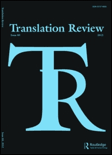
TRANSLATION REVIEW
Exploring New Horizons in Translation Studies.TRANSLATION REVIEW is an esteemed academic journal dedicated to advancing the field of translation studies, encompassing critical analysis and theoretical explorations that inform contemporary practices in linguistics and literature. Published by Routledge Journals, Taylor & Francis Ltd, this journal has earned a respectable reputation within the scholarly community, evident from its current categorization in the Q3 quartile in Linguistics and Language and Q2 in Literature and Literary Theory. With issues spanning from 1978 to the present, TRANSLATION REVIEW reflects a rich legacy of scholarly discourse while also engaging with emerging trends in translation theory and pedagogy. The journal's Scopus rankings place it within the top 30% percentile of Arts and Humanities research, providing a significant platform for researchers and professionals to disseminate their findings. As a non-open access journal based in the United Kingdom, it welcomes contributions that offer new insights and foster dialogue around translation's multifaceted impact in a global context. Scholars, practitioners, and advanced students will find this journal an invaluable resource for both theoretical frameworks and practical applications in translation studies.
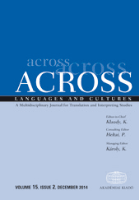
Across Languages and Cultures
Cultivating Multidisciplinary Perspectives in LinguisticsAcross Languages and Cultures is a leading journal in the field of Linguistics and Language, published by AKADEMIAI KIADO ZRT in Hungary. With its ISSN 1585-1923 and E-ISSN 1588-2519, the journal has established itself as a prominent platform for advancing research and discussion in the dynamics of language across diverse cultural contexts. Its impressive Q1 category ranking indicates its significant influence, with a Scopus rank of #227 in Language and Linguistics, showcasing its robust academic impact (79th percentile). This journal, converging from 2007 to 2024, aims to foster interdisciplinary dialogue and promote innovative research methodologies in multilingual studies. Though not an open-access journal, Across Languages and Cultures provides invaluable insights for researchers, professionals, and students eager to explore the intricacies of language use and its sociocultural implications. Located at Budafoki Ut 187-189-A-3, H-1117 Budapest, Hungary, it continues to serve as an essential resource for those passionate about the linguistic sciences.
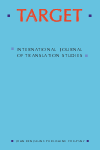
Target-International Journal of Translation Studies
Transforming Translation Theory into PracticeTarget - International Journal of Translation Studies, published by John Benjamins Publishing Co, stands as a leading academic forum in the fields of translation studies, communication, and linguistics. Established in 1989, this prestigious journal has successfully evolved, boasting a Q1 classification in 2023 within both Communication and Linguistics and Language categories, reflecting its significant impact and influence in these disciplines. With an impressive positioning in the Scopus ranks, it is recognized as one of the top journals in its field, being placed in the 88th percentile for Language and Linguistics, and in the 87th percentile for Linguistics and Language within the Social Sciences. Its rigorous scholarly contributions foster a greater understanding of translation practices, theories, and methodologies, making it an essential resource for researchers, professionals, and students alike. While it does not currently offer open access, its comprehensive articles and studies greatly enrich discussions and advancements in translation and communication studies.

Interpreter and Translator Trainer
Redefining the Landscape of Translation TrainingInterpreter and Translator Trainer, published by Routledge Journals, Taylor & Francis Ltd, is an esteemed academic journal dedicated to the fields of education, linguistics, and translation studies. With an ISSN of 1750-399X and E-ISSN 1757-0417, this journal has established itself as a leading platform for scholarly discourse and innovative research since its inception in 2007. Housed in the United Kingdom, it is recognized for its high academic standards, evidenced by its Q1 rankings in both Education and Linguistics for 2023. The journal explores significant developments in interpreter and translator training, providing a vital resource for researchers, educators, and practitioners striving to enhance their pedagogical frameworks and methodologies. With its impressive Scopus rankings reflecting a strong impact in the arts, humanities, and social sciences, Interpreter and Translator Trainer serves as an essential publication for those committed to advancing the understanding and practice of translation and interpreter education. The journal remains accessible via traditional subscription models, inviting contributions that push the boundaries of research and teaching in these interconnected fields.